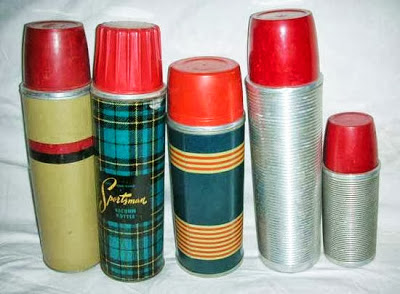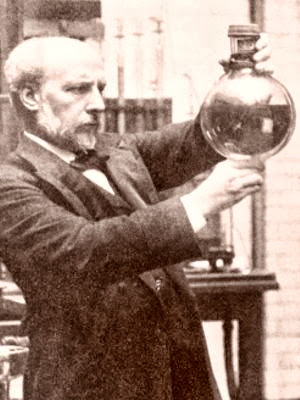Philosophy


by
Esther Inglis-Arkell
Spetember 29th, 2013
io9
For all you aspiring inventors out there, here's a reason to keep up on your patent law. Have you heard of thermoses? They're the subject of not one, but two major patent disputes. Only one will engage your sympathy.
On the Thermos brand website, there's a little history of the invention. It starts with the thermos's invention and naming, stating:
You'll notice that the history does not include the negotiation with James Dewar of a fair price or percentage of the profits from his invention. It is not omitted merely due to the boring technical jargon of financial arrangements. Dewar never got a penny for his invention.
This is a shame, because it's a pretty neat one that includes a fun fact about physics. A vacuum makes a great insulator - because it stops a material's ability to transfer heat through convection. Most kinds of heat transfer result on heat being released or absorbed. Convection relies on the behavior of a material. Smoke rises from a fire because of the fire's heat. The fire heats the air just above it, and the air expands and moves upwards. This allows more air, colder air, to rush in and be heated in turn. If the warm air stayed near the fire, the heat transfer wouldn't happen anywhere near as fast. (Also the fire would be smothered because no fresh oxygen would reach it.) The process happens in air and water, but can't happen in a vacuum.
Dewar suspended on bottle inside another, and pumped out all the air between the two bottles. He wrapped the inner bottle in silver foil to reflect the infrared radiation of the material. Between the two, the invention could keep liquids warm for hours. It was a great invention, and he sued Thermos GmBH for manufacturing it without giving him money for it. Sadly, because he hadn't filed a patent, he lost. Thermos got rich, but soon had a patent problem of its own. The term "thermos" became such a generic term for Dewar's invention that they lost the exclusive rights to the word.
James Dewar [Wikipedia]
Vacuum flask [Wikipedia]
- Monsanto Wins In Court Decision
"Farmers cannot replicate Monsanto seeds for second crop, Supreme Court rules" The Supreme Court ruled against an Indiana farmer who sought to cut the planting cost of his soybean crop by relying on subsequent generations of a patented Monsanto herbicide-resistant...
- Farmer Vernon Hugh Bowman Vs Monsanto
"U.S. Supreme Court Hears Monsanto Seed Saver Case" February 22nd, 2013 Market to Market PBS America’s farmers have taken to genetically engineered seeds in a big way. Modern marvels of the lab include herbicide-tolerant crops, developed to survive...
- David Henderson Houston...patent Number 248,179...october 11th, 1881
A significant patent was granted to David Houston on this day 129 years ago--photographic roll film. Online Artist Archive of North Dakota by Ben Nemenoff Although not a photographer himself and virtually unknown today, David Houston made some of the...
- James Dewar...the "thermos" Man
James Dewar September 20th, 1842 to March 27th, 1923 In 1878, liquid air obtained at a temperature of -192ºC was exhibited by Professor James Dewar at the Royal Institution, London. His work followed the small-scale production of liquid air by Raoul...
- Deceased--frank J. Low
Frank J. Low November 23rd, 1933 to June 11th, 2009 "Frank J. Low, Who Helped Drive Field of Infrared Astronomy, Dies at 75" by Dennis Overbye June 21st, 2009 The New York Times Frank J. Low, who helped astronomers extend their vision beyond visible...
Philosophy
Sir James Dewar and the thermos


"How the Thermos corporation cheated the inventor of the thermos"
by
Esther Inglis-Arkell
Spetember 29th, 2013
io9
For all you aspiring inventors out there, here's a reason to keep up on your patent law. Have you heard of thermoses? They're the subject of not one, but two major patent disputes. Only one will engage your sympathy.
On the Thermos brand website, there's a little history of the invention. It starts with the thermos's invention and naming, stating:
Invented in 1892 by Sir James Dewar, a scientist at Oxford University. The "vacuum flask" was first manufactured for commercial use in 1904, when two German glass blowers formed Thermos GmbH. They held a contest to name the "vacuum flask" and a resident of Munich submitted "Thermos", which came from the Greek word "Therme" meaning "heat".
You'll notice that the history does not include the negotiation with James Dewar of a fair price or percentage of the profits from his invention. It is not omitted merely due to the boring technical jargon of financial arrangements. Dewar never got a penny for his invention.
This is a shame, because it's a pretty neat one that includes a fun fact about physics. A vacuum makes a great insulator - because it stops a material's ability to transfer heat through convection. Most kinds of heat transfer result on heat being released or absorbed. Convection relies on the behavior of a material. Smoke rises from a fire because of the fire's heat. The fire heats the air just above it, and the air expands and moves upwards. This allows more air, colder air, to rush in and be heated in turn. If the warm air stayed near the fire, the heat transfer wouldn't happen anywhere near as fast. (Also the fire would be smothered because no fresh oxygen would reach it.) The process happens in air and water, but can't happen in a vacuum.
Dewar suspended on bottle inside another, and pumped out all the air between the two bottles. He wrapped the inner bottle in silver foil to reflect the infrared radiation of the material. Between the two, the invention could keep liquids warm for hours. It was a great invention, and he sued Thermos GmBH for manufacturing it without giving him money for it. Sadly, because he hadn't filed a patent, he lost. Thermos got rich, but soon had a patent problem of its own. The term "thermos" became such a generic term for Dewar's invention that they lost the exclusive rights to the word.
James Dewar [Wikipedia]
Vacuum flask [Wikipedia]
- Monsanto Wins In Court Decision
"Farmers cannot replicate Monsanto seeds for second crop, Supreme Court rules" The Supreme Court ruled against an Indiana farmer who sought to cut the planting cost of his soybean crop by relying on subsequent generations of a patented Monsanto herbicide-resistant...
- Farmer Vernon Hugh Bowman Vs Monsanto
"U.S. Supreme Court Hears Monsanto Seed Saver Case" February 22nd, 2013 Market to Market PBS America’s farmers have taken to genetically engineered seeds in a big way. Modern marvels of the lab include herbicide-tolerant crops, developed to survive...
- David Henderson Houston...patent Number 248,179...october 11th, 1881
A significant patent was granted to David Houston on this day 129 years ago--photographic roll film. Online Artist Archive of North Dakota by Ben Nemenoff Although not a photographer himself and virtually unknown today, David Houston made some of the...
- James Dewar...the "thermos" Man
James Dewar September 20th, 1842 to March 27th, 1923 In 1878, liquid air obtained at a temperature of -192ºC was exhibited by Professor James Dewar at the Royal Institution, London. His work followed the small-scale production of liquid air by Raoul...
- Deceased--frank J. Low
Frank J. Low November 23rd, 1933 to June 11th, 2009 "Frank J. Low, Who Helped Drive Field of Infrared Astronomy, Dies at 75" by Dennis Overbye June 21st, 2009 The New York Times Frank J. Low, who helped astronomers extend their vision beyond visible...
